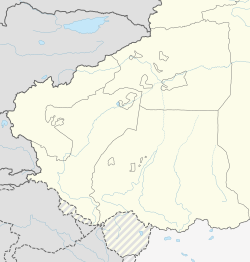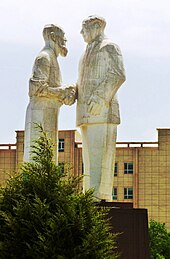| Keriya | |
|---|---|
| County-level city | |
 | |
| Coordinates: 36°51′N 81°40′E / 36.850°N 81.667°E / 36.850; 81.667 | |
| Country | People's Republic of China |
| Autonomous region | Xinjiang |
| Prefecture | Hotan |
| County | Yutian/Keriya |
| Population | |
| • Total | 30,179 |
| Ethnic groups | |
| • Major ethnic groups | Uyghur, Han Chinese |
| Time zone | UTC+8 (China Standard) |
| Postal code | 839000 |
| Area code | 0903 |
| Local languages | Uyghur, Mandarin Chinese |
| Keriya Town | |||||||||||
|---|---|---|---|---|---|---|---|---|---|---|---|
| Chinese name | |||||||||||
| Traditional Chinese | 木尕拉鎮 | ||||||||||
| Simplified Chinese | 木尕拉镇 | ||||||||||
| |||||||||||
| Uyghur name | |||||||||||
| Uyghur | كېرىيە | ||||||||||
| |||||||||||
Keriya Town or Mugala Town is a town in Yutian (Keriya) County, Hotan Prefecture, Xinjiang, China, on the old Southern Silk Road. As the commercial and administrative centre of Keriya County, it is about 166 km east of Hotan, 80 km east of Qira, and 120 km west of Niya. Yutian County has a population of about 160,000.
History
The small modern town of Keriya is situated on the western bank of the Keriya River. Approximately 180 km north along the Keriya River is the ancient fortified site of Karadong, where the world's oldest Buddhist murals have been found. It was abandoned in the 4th century CE. Another site, Yuan Sha, some 40 km north of Karadong, dates from the Iron Age but was abandoned by about 130 BCE.
There is a village about 75 km south of Keriya called Pulu. There are a number of peaks over 6,000 metres to the south of the oasis, including Qong Muztag at 6,962 m (22,841 ft) in the upper Keriya River Valley. About 100 families of the distinctive Keriya Uyghurs, who are said to be quite distinct from other Uyghurs, live at Tangzubasti Village, about 170 km north of the town of Yutian. It is said to be on the ruins of the ancient city of Keladun where artifacts from the Han Dynasty (206 BCE – 222 CE) have been found.
Marco Polo visited the oasis in the late 13th century. He described it as being five days' journey in extent, but with sandy deserts to both east and west. Both the province and the capital city were called Pem or Peyn. He noted that the people were Muslims, and that there were many towns and villages. He indicated that there were plenty of products there, including cotton. He also mentions that "jasper" (probably nephrite jade) and chalcedony were found in the rivers and the people "live by manufacture and trade". He also wrote of their custom: "...if a married man goes to a distance from home to be absent twenty days, his wife has a right, if she is inclined, to take another husband; and the men, on the same principle, marry wherever they happen to reside."
Gold mines were reported near Keriya in the 19th century.
In 2013, Xingfu and Hexie were listed as residential communities in the town.
In 2017, eight residential communities and seven villages were added to those listed as part of the town.
Administrative divisions

As of 2018, the town was made up of eighteen residential communities and twenty-four villages.
Residential communities (Mandarin Chinese Hanyu Pinyin-derived names):
- Kunlun (昆仑社区), Jiande (建德社区), Tuanjie (团结社区), Yucheng (玉城社区), Wusitangbeixi/Wusitangbashi (吾斯塘贝希社区/吾斯塘巴什社区), Aitika (艾提卡社区/艾提喀社区), Tanaibeixi/Tanaiyibeixi (塔乃贝希社区/塔乃依贝希社区), Dunbage (墩巴格社区), Xingfu (幸福社区), Hexie (和谐社区), Tianmei (阗美社区), Tianyuan (阗园社区), Chaoyang (朝阳社区), Guangming (光明社区), Kuaile (快乐社区), Guzai (古再社区), Meigui (玫瑰社区), Kutazibeixi (库塔孜贝希社区)
Villages:
- Guzai (古再村), Aremukamu (阿热木喀木村), Mugakulebeixi/Mugakulebashi (木尕库勒贝希村/木尕库勒巴什村), Kaga (喀尕村/卡尕村), Ale (阿勒村), Tugemankuoqia (吐格曼阔恰村), Andaikulebeixi/Andaikulebashi (安代库勒贝希村/安代库勒巴什村), Mugala (木尕拉村), Bashikaqun (巴什喀群村), Ayagekaqun/Ayakekaqun (阿亚格喀群村/阿亚克喀群村), Yingqikai'airike/Yingqige'aireke (英其开艾日克村/英其格艾热克村), Kariman (喀日曼村), Asiting'aoyi/Asitingwuyi (阿斯廷奥依村/阿斯廷乌依村), Wusitangwuqi (吾斯塘吾其村), Kongkamazha (空喀麻扎村), Kukairen (库开仁村), Bositan (博斯坦村), Lüzhou (绿洲村), Taoyuan (桃园村), Youyi (友谊村), Akeyilaike (阿克依来克村), Maidiniyeti (买迪尼也提村), Yitipake (依提帕克村), Keliya (克里雅村)
In 2009, residential communities and villages in the town were:
Residential communities (Mandarin Chinese Hanyu Pinyin-derived names):
- Kunlun (昆仑社区), Jiande (建德社区), Tuanjie (团结社区), Yucheng (玉城社区), Wusitangbeixi (吾斯塘贝希社区), Aitika (艾提卡社区), Tanaibeixi (塔乃贝希社区), Dunbage (墩巴格社区)
Villages:
- Guzai (古再村), Aremukamu (阿热木喀木村), Mugakulebeixi (木尕库勒贝希村), Kaga (喀尕村), Ale (阿勒村), Tugemankuoqia (吐格曼阔恰村), Andaikulebeixi (安代库勒贝希村), Mugala (木尕拉村), Bashikaqun (巴什喀群村), Ayagekaqun (阿亚格喀群村), Yingqikai'airike (英其开艾日克村), Kariman (喀日曼村), Asiting'aoyi (阿斯廷奥依村), Wusitangwuqi (吾斯塘吾其村), Kongkamazha (空喀麻扎村), Kukairen (库开仁村), Bositan (博斯坦村)
Transportation
See also
References
- 于田县历史沿革 [Yutian County Historical Development] (in Simplified Chinese). XZQH.org. 2 December 2014. Retrieved 11 December 2019.
2000年第五次人口普查,于田县常住总人口212061人,其中:木尕拉镇37252人、{...}2010年第六次人口普查,于田县常住总人口249899人,其中:木尕拉镇30179人,
- ^ 1997年于田县行政区划 [1997 Keriya County Administrative Divisions]. XZQH.org. 6 January 2011. Retrieved 4 April 2020.
木尕拉镇 县政府驻地。面积56平方千米,人口2万,有维吾尔、汉等民族。其中维吾尔族占87%;汉族占13%。315国道从境内穿过,
- 和田市概况. Hotan Government Statistics. June 17, 2013. Archived from the original on November 29, 2014.
- J.M. Dent (1908), "Chapter 34: Of the Province of Peyn - of the chalcedonies and jasper found in its river - and of a peculiar custom with regard to marriage", The travels of Marco Polo the Venetian, p. 97
- Hill (2015) Vol. I, p. 196.
- 2013年统计用区划代码和城乡划分代码:木尕拉镇 [2013 Statistical Area Numbers and Rural-Urban Area Numbers: Mugala Town] (in Simplified Chinese). National Bureau of Statistics of the People's Republic of China. 2013. Retrieved 14 January 2020.
代码 城乡分类 名称 653226100001 121 昆仑社区居委会 653226100002 121 建德社区居委会 653226100003 121 团结社区居委会 653226100004 121 玉城社区居委会 653226100005 121 吾斯塘贝希社区居委会 653226100006 121 艾提卡社区居委会 653226100007 121 塔乃贝希社区居委会 653226100008 121 墩巴格社区居委会 653226100009 121 幸福社区居委会 653226100010 121 和谐社区居委会 653226100200 220 古再村委会 653226100201 122 阿热木喀木村委会 653226100202 220 木尕库勒贝希村委会 653226100203 122 喀尕村委会 653226100204 122 阿勒村委会 653226100205 122 吐格曼阔恰村委会 653226100206 122 安代库勒贝希村委会 653226100207 220 木尕拉村委会 653226100208 121 巴什喀群村委会 653226100209 122 阿亚格喀群村委会 653226100210 122 英其开艾日克村委会 653226100211 122 喀日曼村委会 653226100212 122 阿斯廷奥依村委会 653226100213 122 吾斯塘吾其村委会 653226100214 220 空喀麻扎村委会 653226100215 220 库开仁村委会 653226100216 220 博斯坦村委会
- 2017年统计用区划代码和城乡划分代码:木尕拉镇 [2017 Statistical Area Numbers and Rural-Urban Area Numbers: Mugala Town] (in Simplified Chinese). National Bureau of Statistics of the People's Republic of China. 2017. Retrieved 14 January 2020.
统计用区划代码 城乡分类代码 名称 653226100001 121 昆仑社区居委会 653226100002 121 建德社区居委会 653226100003 121 团结社区居委会 653226100004 121 玉城社区居委会 653226100005 121 吾斯塘贝希社区居委会 653226100006 121 艾提卡社区居委会 653226100007 121 塔乃贝希社区居委会 653226100008 121 墩巴格社区居委会 653226100009 121 幸福社区居委会 653226100010 121 和谐社区居委会 653226100011 121 阗美社区居委会 653226100012 121 阗园社区居委会 653226100013 121 朝阳社区居委会 653226100014 121 光明社区居委会 653226100015 121 快乐社区居委会 653226100016 121 古再社区居委会 653226100017 121 玫瑰社区居委会 653226100018 121 库塔孜贝希社区居委会 653226100200 220 古再村委会 653226100201 122 阿热木喀木村委会 653226100202 220 木尕库勒贝希村委会 653226100203 122 喀尕村委会 653226100204 122 阿勒村委会 653226100205 122 吐格曼阔恰村委会 653226100206 122 安代库勒贝希村委会 653226100207 220 木尕拉村委会 653226100208 121 巴什喀群村委会 653226100209 122 阿亚格喀群村委会 653226100210 122 英其开艾日克村委会 653226100211 122 喀日曼村委会 653226100212 122 阿斯廷奥依村委会 653226100213 122 吾斯塘吾其村委会 653226100214 220 空喀麻扎村委会 653226100215 220 库开仁村委会 653226100216 220 博斯坦村委会 653226100217 220 绿洲村委会 653226100218 220 桃园村委会 653226100219 220 友谊村委会 653226100300 220 阿克依来克村委会 653226100301 220 买迪尼也提村委会 653226100302 220 依提帕克村委会 653226100303 220 克里雅村委会
- 2018年统计用区划代码和城乡划分代码:木尕拉镇 [2018 Statistical Area Numbers and Rural-Urban Area Numbers: Mugala Town] (in Simplified Chinese). National Bureau of Statistics of the People's Republic of China. 2018. Retrieved 12 January 2020.
统计用区划代码 城乡分类代码 名称 653226100001 121 昆仑社区居委会 653226100002 121 建德社区居委会 653226100003 121 团结社区居委会 653226100004 121 玉城社区居委会 653226100005 121 吾斯塘贝希社区居委会 653226100006 121 艾提卡社区居委会 653226100007 121 塔乃贝希社区居委会 653226100008 121 墩巴格社区居委会 653226100009 121 幸福社区居委会 653226100010 121 和谐社区居委会 653226100011 121 阗美社区居委会 653226100012 121 阗园社区居委会 653226100013 121 朝阳社区居委会 653226100014 121 光明社区居委会 653226100015 121 快乐社区居委会 653226100016 121 古再社区居委会 653226100017 121 玫瑰社区居委会 653226100018 121 库塔孜贝希社区居委会 653226100200 220 古再村委会 653226100201 122 阿热木喀木村委会 653226100202 220 木尕库勒贝希村委会 653226100203 122 喀尕村委会 653226100204 122 阿勒村委会 653226100205 122 吐格曼阔恰村委会 653226100206 122 安代库勒贝希村委会 653226100207 220 木尕拉村委会 653226100208 121 巴什喀群村委会 653226100209 122 阿亚格喀群村委会 653226100210 122 英其开艾日克村委会 653226100211 122 喀日曼村委会 653226100212 122 阿斯廷奥依村委会 653226100213 122 吾斯塘吾其村委会 653226100214 220 空喀麻扎村委会 653226100215 220 库开仁村委会 653226100216 220 博斯坦村委会 653226100217 220 绿洲村委会 653226100218 220 桃园村委会 653226100219 220 友谊村委会 653226100300 220 阿克依来克村委会 653226100301 220 买迪尼也提村委会 653226100302 220 依提帕克村委会 653226100303 220 克里雅村委会
- 于田县行政区. 于田政府网 (in Simplified Chinese). 22 March 2018. Archived from the original on 11 December 2019. Retrieved 11 December 2019.
木尕拉镇 辖4个社区、17个村委会:吾斯塘巴什社区、艾提喀社区、塔乃依贝希社区、墩巴格社区、巴什喀群村、阿亚克喀群村、古再村、阿热木喀木村、木尕库勒巴什村、卡尕村、吾斯塘吾其村、空喀麻扎村、库开仁村、阿勒村、安代库勒巴什村、木尕拉村、吐格曼阔恰村、英其格艾热克村、喀日曼村、阿斯廷乌依村、博斯坦村。
- 2009年统计用区划代码和城乡划分代码:木尕拉镇 [2009 Statistical Area Numbers and Rural-Urban Area Numbers: Mugala Town] (in Simplified Chinese). National Bureau of Statistics of the People's Republic of China. 2009. Retrieved 14 January 2020.
代码 城乡分类 名称 653226100001 121 昆仑社区居委会 653226100002 121 建德社区居委会 653226100003 121 团结社区居委会 653226100004 121 玉城社区居委会 653226100005 121 吾斯塘贝希社区居委会 653226100006 121 艾提卡社区居委会 653226100007 121 塔乃贝希社区居委会 653226100008 121 墩巴格社区居委会 653226100200 122 古再村委会 653226100201 122 阿热木喀木村委会 653226100202 122 木尕库勒贝希村委会 653226100203 122 喀尕村委会 653226100204 122 阿勒村委会 653226100205 122 吐格曼阔恰村委会 653226100206 122 安代库勒贝希村委会 653226100207 122 木尕拉村委会 653226100208 121 巴什喀群村委会 653226100209 122 阿亚格喀群村委会 653226100210 122 英其开艾日克村委会 653226100211 122 喀日曼村委会 653226100212 122 阿斯廷奥依村委会 653226100213 122 吾斯塘吾其村委会 653226100214 122 空喀麻扎村委会 653226100215 220 库开仁村委会 653226100216 220 博斯坦村委会
- 2009年于田县行政区划 [2009 Yutian County Administrative Divisions] (in Simplified Chinese). XZQH.org. 6 January 2011. Retrieved 12 January 2020.
行政区划代码及城乡划分代码 653226 于田县 653226100 木尕拉镇 653226100001 121 昆仑社区 653226100002 121 建德社区 653226100003 121 团结社区 653226100004 121 玉城社区 653226100005 121 吾斯塘贝希社区 653226100006 121 艾提卡社区 653226100007 121 塔乃贝希社区 653226100008 121 墩巴格社区 653226100200 122 古再村 653226100201 122 阿热木喀木村 653226100202 122 木尕库勒贝希村 653226100203 122 喀尕村 653226100204 122 阿勒村 653226100205 122 吐格曼阔恰村 653226100206 122 安代库勒贝希村 653226100207 122 木尕拉村 653226100208 121 巴什喀群村 653226100209 122 阿亚格喀群村 653226100210 122 英其开艾日克村 653226100211 122 喀日曼村 653226100212 122 阿斯廷奥依村 653226100213 122 吾斯塘吾其村 653226100214 122 空喀麻扎村 653226100215 220 库开仁村 653226100216 220 博斯坦村
Further reading
- Baumer, Christoph. 2000. Southern Silk Road: In the Footsteps of Sir Aurel Stein and Sven Hedin. White Orchid Books. Bangkok.
- Bonavia, Judy 2004. The Silk Road From Xi’an to Kashgar. Revised by Chrisoph Baumer. 2004. Odyssey Publications. ISBN 962-217-741-7
- Hulsewé, A. F. P. (1979). China in Central Asia: The Early Stage 125 BC – AD 23: an annotated translation of chapters 61 and 96 of the History of the Former Han Dynasty. E. J. Brill, Leiden.
- Latham, Ronald. 1958. The Travels of Marco Polo. Translated and Introduced by Ronald Latham. Reprint 1982 by Abaris Books, New York. ISBN 0-89835-058-1
- Mallory, J. P. and Mair, Victor H. (2000). The Tarim Mummies: Ancient China and the Mystery of the Earliest Peoples from the West. Thames & Hudson. London. ISBN 0-500-05101-1
- Skrine, C. P. 1926. Chinese Central Asia. Methuen, London. Reprint: Barnes & Noble, New York. 1971.
- Stein, M. Aurel 1907. Ancient Khotan: Detailed report of archaeological explorations in Chinese Turkestan, 2 vols. Oxford. Clarendon Press.
- Stein, M. Aurel 1912. Ruins of Desert Cathay: Personal narrative of explorations in Central Asia and westernmost China, 2 vols. Reprint: Delhi. Low Price Publications. 1990.
- Stein, M. Aurel 1921. Serindia: Detailed report of explorations in Central Asia and westernmost China, 5 vols. London. Oxford. Clarendon Press. Reprint: Delhi. Motilal Banarsidass. 1980.
- Yu, Taishan. 2004. A History of the Relationships between the Western and Eastern Han, Wei, Jin, Northern and Southern Dynasties and the Western Regions. Sino-Platonic Papers No. 131 March, 2004. Dept. of East Asian Languages and Civilizations, University of Pennsylvania.
External links
- 3000-year-old archaeological finds at Liushui Village, Yutian County
- Archaeological GIS and Oasis Geography in the Tarim Basin
| County-level divisions of Xinjiang Uyghur Autonomous Region | |||||||||
|---|---|---|---|---|---|---|---|---|---|
| Ürümqi (capital) | |||||||||
| Prefecture-level cities |
| ||||||||
| Sub-provincial autonomous prefecture |
| ||||||||
| Prefectures |
| ||||||||
| Autonomous prefectures |
| ||||||||
| XPCC administered |
| ||||||||
| |||||||||